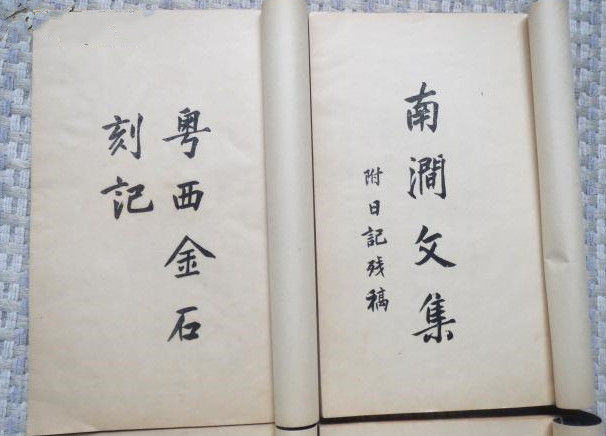Xia and Shun
On the seventh day of November in the thirty-fourth year of Qianlong (1769), Li Wenzao left the Beijing Division and went to Enpingzhi County, Guangdong. Contrary to the journey, the long night was long, and he dispatched himself in the name of recalling the Liulichang shop and compiled the "Liulichang Bookstore Record", which was more than 1,500 words.

△ "Nanjian Anthology of Golden Stone Carvings in Western Guangdong", by Li Wenzao
Li Wenzao is the author of "Records of Golden Stone Carvings in Western Guangdong", "Records of Shandong Yuan Tablets", "Cantonese Proverbs", etc., and the most famous is "Records of Liulichang Bookstore". At the end of the Qing Dynasty, Li Cimingyun: "The "Record of the Liulichang Bookstore" is quite a manifestation of the grandeur of the cultural relics of the day, and it is also known to those who will be in charge of the Kaodu Gate in the future. ”
Interestingly, the books that Li Wenzao bought in the factory, that is, Qu Dajun wrote "Guangdong New Language" in the late Ming and early Qing dynasties, which he called "the omen of xuan Enping" in the "Bookshop".
△ Qu Dajun's "Guangdong New Language"
Li Wenzao (1730-1778), zi su bo, late nanjian. A native of Yidu (present-day Qingzhou), Shandong, he entered the qianlong 26th year (1761) and Ji Yun was a fangshi. He once supported his Fujian xuezheng curtain, and then went to Beijing to report for duty and also lived in Weicaotang.
In May of the thirty-fourth year of Qianlong (1769), Li Wenzao was elected to Beijing, lived in Baishun Hutong, and signed the election to Enping County, Guangdong Province, at the end of September, he received the certificate, and left Beijing in early November, a total of more than five months. "There is no socializing, and I don't like to watch dramas, tea garden taverns, footprints have not tasted, but borrow books to copy them", he once borrowed books from Ji Yun and others to copy. "Walking into the Glass Factory to read books" is the greatest pleasure. Because he lives in Beijing temporarily, he does not buy many books, and he has almost no one who is not in the Liuli Factory Bookstore.
The "Records of Liulichang Bookstore" traces the names of various bookstores, shop owners and their sources of sales, and also records the purchase and witnessing of rare books, which is actually the founding of Liulichang Bookstore. According to Li Wenzao's account, there were at least 30 shops in Liulichang at that time: Shengyao Hall, Songxiu Hall, Mingsheng Hall, Daicao Hall, Tongsheng Pavilion, Zongsheng Hall, Bible Hall, Jixiu Hall, Eryou Hall, Wenjin Hall, and so on. These books barely existed when Miao Quansun wrote the Afterword to the Liulichang Bookstore.
According to his records, most of the booksellers in Beijing before the opening of the Siku Quanshu were from Jinxi, Jiangxi. The liuli factory is two miles long from east to west, the bridge is in the middle of the factory, and the north is opposite the kiln. There are several bookstores in zhengyangmen east grinding factory, all of which are jinxi people, and the sellers of new books. In addition, there are people from Suzhou, Huzhou and other places. In addition to bookstores, there are other industries in the factory. Qiaodong Street is narrow, and people are involved in selling daily necessities such as glasses and cigarette tubes; Qiaoxi Street is wide, and there are still antique shops, as well as shops selling Fa Ti, framed calligraphy paintings, carved seals, wrapped books, and stereotyped engravings. Near the bridge, there are teeth fillings, lip fillings, eye repairs, and medicines for sale. If the court test enters the scene, the factory has a test pen, a roll, an ink pot, a paperweight, a bow shed, a folded mattress and other items.
△ "The End of the Chronicle of The General Chronicle" book shadow
Among the 30 bookstores, The Eryoutang originated from the Ming Dynasty, because it was called the Old Eryou. Li Wenzao bought the most books here, including the banknotes "Song Tong JianChang's Chronicle of the End of the Chronicle", "Lupu Notes", "Dust History", "Yu Jian", "Qiankun Qingqi", "Fushui Collection", "Lü Jingfu Poetry Collection", Duan's "Ermiao Collection", "Compilation of Etiquette Studies", "Jianyan Restoration", etc., engraved "Chang'an Zhi", "Chicken Rib Collection", "Hu Yunfeng Collection", "Huang Jia Weng Collection", "Jianghu Chang Weng Collection", "Tang Meishan Collection" and so on.
Zhou's Treasure Hall is in the north of Qiaoxi Road, originally selling practical books such as shi books and laws, but at that time, it purchased more than 2,000 sets of books in the Prince Guo's mansion, with exquisite decoration and all the pictures. Li Wenzao purchased Liang Yin's "Yuan Shi Luo", "Jie Wen An Ji", "Reading History of Fang Public Opinion Minutes", etc., all of which are copied; half of the "Self-Police Compilation" and one "Wen Gong Shuyi" are all Song Shu ben. This shop also has the original manuscript of Fang Wangxi's book, the manuscript "Yuan Gui of the Book" and the "Record of Ming Xianzong". JixiuTang has two copies of Yang Wanli and Hong Panzhou, asking for 30,000 yuan, but due to the shortage of money, it is returned after borrowing readings for a few days, and it is still impossible to release the thoughts.
Review: Sun Shijian